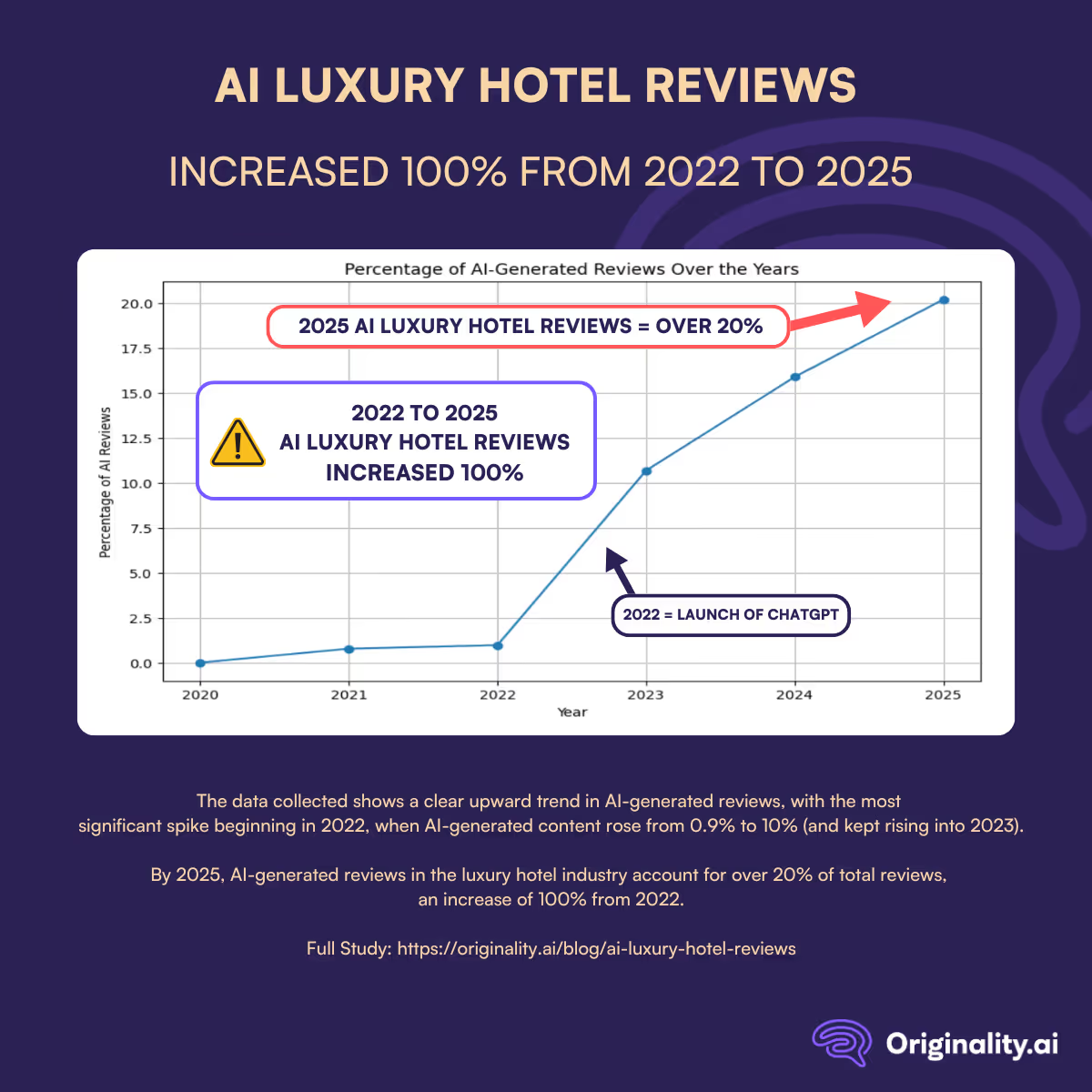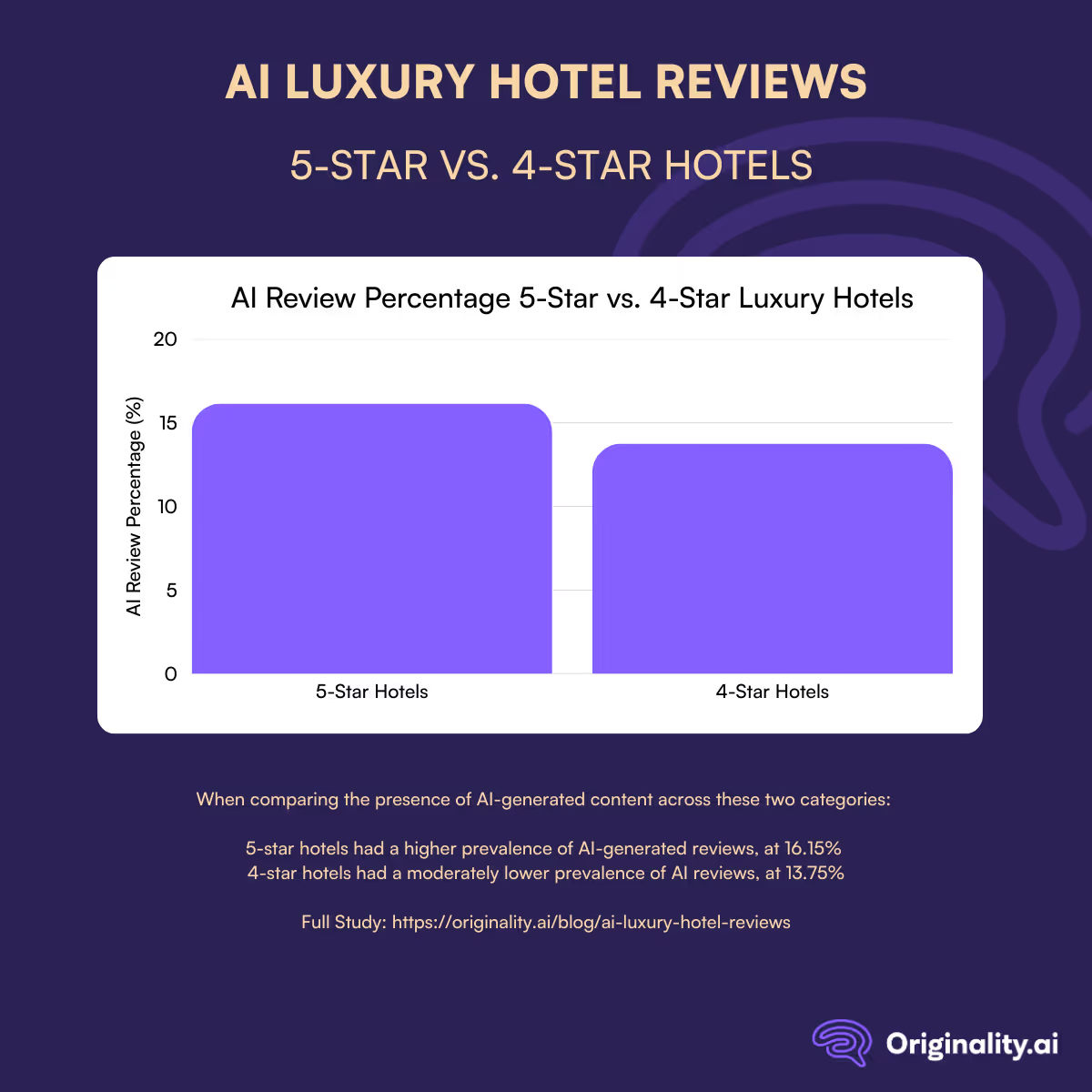With the rise of AI-generated content on the internet today, concerns about authenticity and transparency have grown significantly, particularly in industries that rely heavily on user reviews and experiences.
This study examines the prevalence of AI-generated content in the luxury hotel industry, an industry renowned for:
By exploring the reviews of 4 and 5-star luxury hotels, we aimed to determine if this industry sector remains authentic in user feedback or if it has been impacted by the influx of AI-generated content observed in other industries.
Luxury hotels in 10 major US cities were included in this study: New York, Los Angeles, Chicago, Houston, Phoenix, Philadelphia, San Antonio, San Diego, Dallas, and Jacksonville.
Each review was then analyzed for AI-generated content using the Originality AI Detector.
Through this analysis, we hope to provide insights into how AI reviews are shaping the luxury hotel industry:
To conduct this analysis, we used a local business data API powered by Google Maps to retrieve information on businesses, including their reviews.
The focus of this study is on luxury hotels. Therefore, only hotels rated 4 and 5 stars were considered.


As of 2025, more than 20% of luxury hotel reviews are AI-generated.
The data collected (and depicted in the graph above) shows a clear upward trend in AI-generated reviews, with the most significant spike occurring during 2022 when AI-generated content rose from 0.9% to 10% (and kept rising into 2023).
As of 2025, AI-generated reviews in the luxury hotel industry now account for over 20% of total reviews — an increase of 100% from 2022.
This growth and increasing trend of AI reviews, particularly following 2022, mirrors patterns that have been observed across other industries that we have studied as well.
2022 is often the tipping point for widespread AI-generated content, as found in our studies on AI lawyer’s office reviews, Canadian ‘Big 5’ bank reviews, and Snapdeal, as it aligns closely with the public release dates of popular LLMs and tools like ChatGPT.
.avif)
Across all of the reviews analyzed, 15% of the total reviews were Likely AI.
While the majority of reviews, at approximately 85% (84.99%), were human-written, the overall percentage of AI content and the rising trend across the time period studied are notable.
This raises concerns for customers looking for authentic insight into previous customer experiences to inform their decisions when booking reservations.
Further, of the AI reviews studied, the majority of AI-generated luxury hotel reviews were 5-star reviews at 56.7%.
The remaining AI luxury hotel reviews had the following star ratings:
This suggests that most luxury hotel reviews classified as AI-generated were positive reviews about the hotels.

This study focused exclusively on luxury hotels, specifically hotels rated four stars and five stars.
When comparing the presence of AI-generated content across these two categories:
This could potentially reflect the efforts of the highest-rated luxury hotels to maintain a strong online image and reputation.

Using data collected across 10 major US cities (New York, Los Angeles, Chicago, Houston, Phoenix, Philadelphia, San Antonio, San Diego, Dallas, and Jacksonville), 10 hotels from each city were selected for the study, totalling 100 luxury hotels.
Our analysis also revealed a variation in the prevalence of AI-generated content across each city. For instance:
The variation suggests that certain regions or cities may be more prone to leveraging AI-generated content than others. Possible reasons for this include: higher hotel volumes, market competition, or other demographic factors.
The findings from this study show a growing trend of AI-generated content in luxury hotel reviews.
In today's digital era, digital transparency is of utmost importance to maintain integrity and consumer confidence. Especially in industries like luxury hotels, where customers are looking to read previous experiences for insight into a hotel before booking reservations.
Do you have concerns over whether a post or review you’re reading might be AI-generated? Use the Originality.ai AI detector to find out.
Read more about the impact of AI on online platforms:
Data Source:
Data was collected using a Google Maps-powered business API from RapidAPI, focusing on 4- and 5-star luxury hotels in 10 major U.S. cities (New York, Los Angeles, Chicago, Houston, Phoenix, Philadelphia, San Antonio, San Diego, Dallas, and Jacksonville).
A total of 100 hotels were selected, from which an initial total of 4,124 reviews was collected.
After cleaning (removing duplicates, nulls, and irrelevant data), 3,947 reviews remained. Only reviews from 2020 with 100+ words were analyzed.
AI Detection Methodology:
Reviews were submitted to the Originality.AI API to assess likelihood of AI authorship. Two metrics were recorded:
Each review included metadata such as hotel name, city, average rating, price, review rating, and AI detection scores. These formed the basis for further analysis.

Is that LinkedIn post you’re reading real or Likely AI? We ran an updated 2025 dataset to find out! Plus, we took an in-depth look at how Likely AI vs. human-written content impacts engagement. These are our research findings.